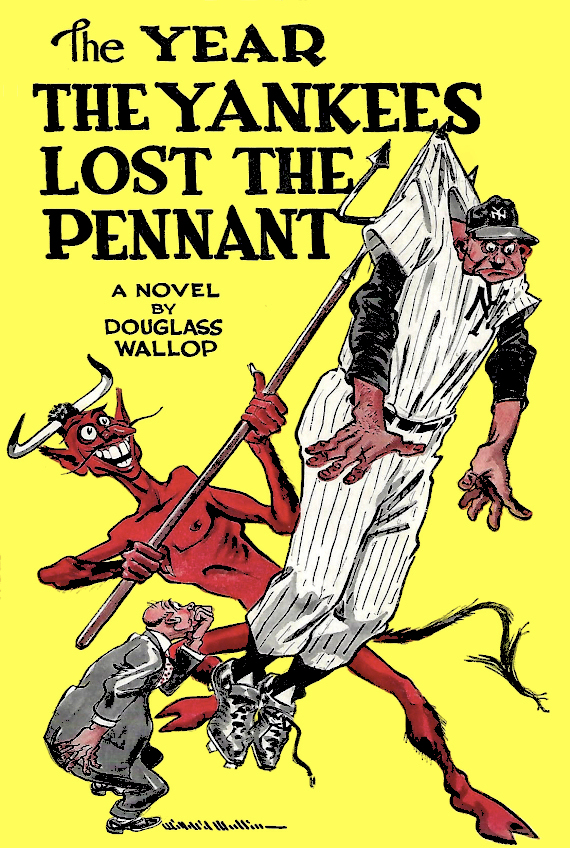
Fred Foy the announcer used to say when introducing the Lone Ranger, “return with us now to those thrilling days of yesteryear.” No, I’m not going to talk about the Lone Ranger—he’s hardly a candidate for an SF/F discussion (even though his nephew fought crime as The Green Hornet). I want to go back to my high-school days, somewhere between 1962 and 1964, when I was prowling the stacks of the Everett (WA) Public Library, looking for interesting SF/F books. The one I found was, I thought, an oddity—something about baseball and the Devil (Figure 1). The book was Douglass Wallop’s The Year the Yankees Lost the Pennant; it was a cute, fun little read, and I enjoyed it.
Then I found out it had been made into a Broadway musical (Figure 2), but the library didn’t have it. (I got a lot of records out of the library.) And then I think I saw the film version on TV (we didn’t have a colour TV at the time, so I would have seen it in black and white. When I came home from California in the ‘70s, I bought my parents their first used colour TV). That soundtrack, the library did have; I played it a lot on my mother’s Zenith radio/record player with the cobra head. (I shudder to think what that record player did to some of the records… it could play 45s [with an adapter], 78s made of shellac, and 33 1/3 LPs… but it wasn’t gentle with any of them.)
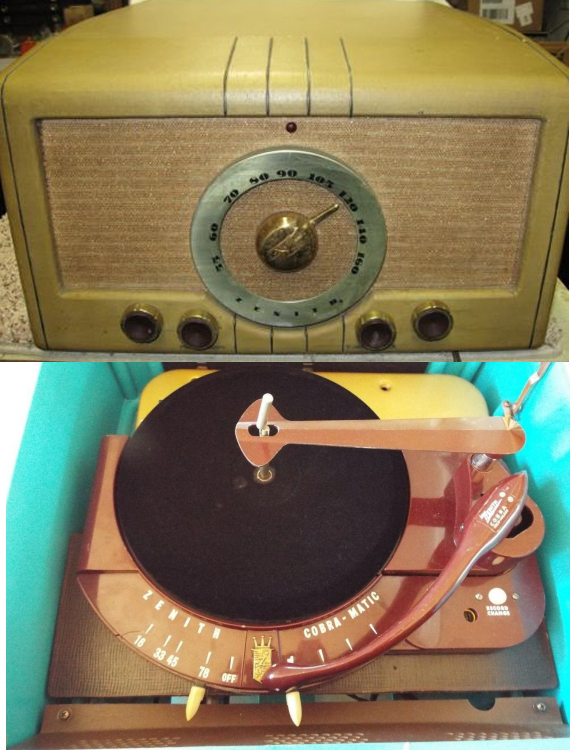
If you look at Figure 2, the top part shows the exterior; the bottom shows the cobra head and interior; these are not my mother’s, but very similar. If the LP we were playing was warped (not an uncommon thing when you borrowed a record from the library), we used to tape a nickel onto the cobra head. You can guess what that did to the grooves. But hey, it’s what we had. Over the years we listened to a lot of records on that thing, and I learned to love classical, big band, musicals, jazz, and a lot more, thanks to my mother’s taste in music. My father, who loved country/western—which my mother couldn’t stand—seldom got to listen to any of his favourites. Except for Slim Dusty’s “The Pub With No Beer,” which was okay with her, because it was Australian (she was Australian; a war bride). He always said he was tone-deaf and “couldn’t carry a tune in a bucket” anyway.
Many of the musicals we listened to were my mother’s choice; we listened to The Unsinkable Molly Brown (Broadway version; Tammy Grimes instead of Debbie Reynolds), and a number of others, but this one (Damn Yankees, remember?) I found myself. So after seeing it on TV in the early ‘60s, I found the movie version of the soundtrack at the library and learned all the songs… of course, most of the cast was the same as the Broadway (and touring) cast; it had run for over 1,000 performances. And a number of the songs went into the collective consciousness—“Whatever Lola Wants,” “You’ve Gotta Have Heart,” “Shoeless Joe From Hannibal, Mo” and so on. (None of those were my favourite—can you guess which one I liked? Yep, it was Ray Walston’s “Those Were the Good Old Days”!)
Here’s a thing: unless you’re an older person, like me, you may not care much for this show; for one thing, it sprang out of the national obsession with baseball which has subsided a whole bunch from what it was in the fifties and earlier. (Football and “soccer”—either Australian rules or European) and other sports have largely taken its place in North America, but in the ‘50s, when this book was written, it was the King of Sports in the U.S. Most boys played sandlot baseball (or stickball in very urban areas); every town had a minor-league team; it was on radio and television—and major-league scores on newsreels in theatres—and everyone knew, pretty much, every major-league player and their stats.

For another thing, it was very much of its time in attitudes between men and women; I’ll get into that in a bit. It took me until just recently to get a DVD copy of the movie (off eBay); it came from some outré place like Kazakhstan, believe it or not (Figure 7). Here’s what the show is about:
Joe Boyd, a middle-aged man (Robert Shafer, film & B’way) living in Washington DC with his wife, is a lifelong fan of the Washington Senators; his team, however, has been mired in mediocrity for decades, despite being one of the original American League clubs. (According to Wikipedia, they had six last-place finishes in the ‘40s and ‘50s. They were moved to Minnesota in 1960, becoming the Minnesota Twins, and Washington wouldn’t get a new MLB team until the Montreal Expos became the Washington Nationals in 2005.) The fact that the Yankees were about to win another pennant and the Senators weren’t even going to make the playoffs got the better of Joe on one hot summer night (his wife, Meg—played by Shannon Bolin both on film and on stage—talks about the summer heat in Hannibal, Missouri, her home town) while he’s watching the Sens lose on TV (Figure 3). They sing “Six Months Out of Every Year” about how he’s barely there during the baseball season. When his team loses, Joe swears he’d sell his soul to the Devil for a chance to help the Sens win the World Series. His wife goes to bed, and Joe steps out onto the porch. Applegate (Ray Walston) is there; Applegate convinces Joe that for the right consideration (his soul), Joe can physically help the Sens by becoming a younger ballplayer. Joe—as an insurance salesman—convinces Applegate to add an “escape clause” in case he, Joe, changes his mind. Joe becomes a younger man—“We’ll call you Joe Hardy,” Applegate says—and Joe Hardy (Tab Hunter on film, Stephen Douglass on stage) goes inside to get his old glove and baseball shoes, singing “Goodbye, Old Girl” as he does so. Applegate calls a taxi and they leave. (Neither Shafer nor Bolin was a particularly good singer, in my opinion. According to my wife, they might have been chosen to contrast with the younger actors. It’s a plausible theory.) And here’s the first thing that wouldn’t sit well with today’s audiences: Joe abandons his wife of many years in order to fulfill a long-held dream. And he’s supposed to be the good guy?
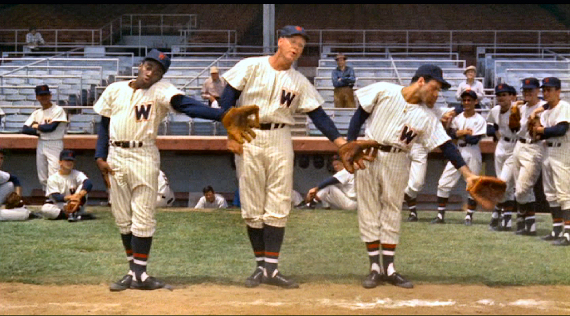
Next day, at the stadium, several of the players are discouraged, but their manager, Benny Van Buren (Russ Brown, film & stage), tells them not to give up, and they sing “You’ve Gotta Have Heart.” Applegate convinces Benny to give Joe a look; Joe rushes to put on his shoes, but they don’t fit—Applegate says “Oops! Must’ve overlooked that detail,”) and one of the other players lends Joe his shoes. Joe hits every ball thrown to him out of the park, and Benny puts him on the team (he wanted to work him up from the farm club, but Joe has no time—if he’s not done by a certain date, Applegate has him forever). A female reporter, Gloria Thorpe (Rae Allen, film & stage) noticed his shoes didn’t fit, and the team joins her in singing “Shoeless Joe From Hannibal, MO” (Figure 4), one of the three best-choreographed scenes in the film.
The team continues its rise with Joe Hardy at the center of attention, and Joe’s wife, Meg, sings “There’s Something About an Empty Chair” after her best friends (also from Hannibal)—including Jean Stapleton (whom we know better as Archie Bunker’s wife from All In The Family)as Doris Miller’s sister—tell her he’s not coming back. Just then, Joe shows up at the front door to rent a room so he can be close to her, even though she doesn’t know who he really is. He’s now a famous ball player, so that works out for a while (until Applegate intimidates her into thinking Joe staying there would be a scandal and he has to leave). The last thing Applegate wants is Joe thinking of home, so he sends for his best asset, Lola (Gwen Verdon, stage and film) to seduce Joe so he will fall farther from grace and miss his exit date (his escape clause). She tells Applegate Joe will be a pushover, singing “A Little Brains, A Little Talent.” After all, she’s seduced many men while working for Applegate; a lot of whom have committed suicide when she throws them over.
Applegate introduces Lola to Joe in the locker room after a game; she does a song-and-dance to convince Joe to take up with her (“Whatever Lola Wants), but he’s having none of it. He’s happily married, and though she’s a nice girl, well, he’s a square.
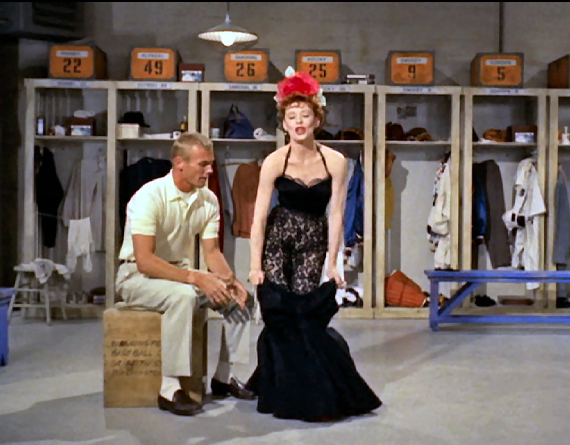
The latter song, “Whatever Lola Wants,” is yet another old-fashioned angle on the male-female role: she dances around and drops into baby talk as a seductive ploy. Personally, I find that stuff not only ridiculous but very off-putting. I’m sure the modern woman would too; but in the ‘50s, that was a somewhat common thing (think of songs like “My Heart Belongs to Daddy”—the whole Daddy/Baby thing demeans both men and women, in my opinion). And this is the least successful bit of Bob Fosse’s usually great choreography, too. Lola’s failure gets Applegate’s goat, and he sings about how easy it used to be to bring people to damnation, with “Those Were the Good Old Days,” while Lola joins a Joe Hardy fan club. “I’m boring from within,” she tells Applegate (but she’s lying; Joe has won her over to his side.)
Meanwhile, the Senators are now in second place, with Joe’s help, winning ten games in a row. There’s a show being put on by the fan club; Meg’s friend Sister Miller (Jean Stapleton) does a rendition of “You’ve Gotta Have Heart” with a bevy of young boys in baseball uniforms, and we come to one of the two absolute highlights of this movie—Bob Fosse and Gwen Verdon perform a terrific number called “Who’s Got The Pain (When They Do the Mambo)?” Two of the top dancers in America at the performing peak of their lives deliver a number that can’t be beat (Figure 6).

Meanwhile, Applegate’s been busy; he hints to Gloria Thorpe, the reporter—who’s just gone to Hannibal to check up on Joe’s background—that “Joe Hardy” is really Shifty McCoy, who was banned from baseball. A hearing is called, and Gloria calls the Hannibal postmaster, who says he’s never heard of Joe, but Applegate gets the hearing postponed till 7:30 p.m., saying he has a witness flying in who knows Shifty. The three women, Meg, Doris Miller, and Sister Miller, decide that since they know Joe’s a “good boy,” they will testify that he was indeed from Hannibal—because the fact that he chose Hannibal to be from is a compliment to Hannibal. This is the last day that Joe has to be free of Applegate, but he can’t get out of the hearing room until midnight, so even though he’s vindicated, he’s damned.
In the second-best song-and-dance routine of the film, Joe and Lola go out to commiserate with each other by bar-hopping, singing “Two Lost Souls.” Lola (with limited assistance from Hunter) does an absolutely perfect ‘50s “beatnik” dance with the patrons of one club, proving once again that Verdon’s one of the best dancers of the day (remember that this is still 1958, and beatniks [or “beats”] were the hippies and goths of their day). Next day’s game will be the game that puts the Senators in—or lets them out—of the playoffs, and Applegate plans to make Joe throw the game, thus ensuring lots of disappointed fans, broken hearts, lost bets, strokes, etc. But Lola drugs his nightcap, and Applegate oversleeps, getting to the ballpark in time for the last out of the game, which will win it or lose it for the Sens. In retaliation, he puts Lola back in the body she wore 300 years ago in Salem, Mass, where she was counted the “ugliest girl in town.”
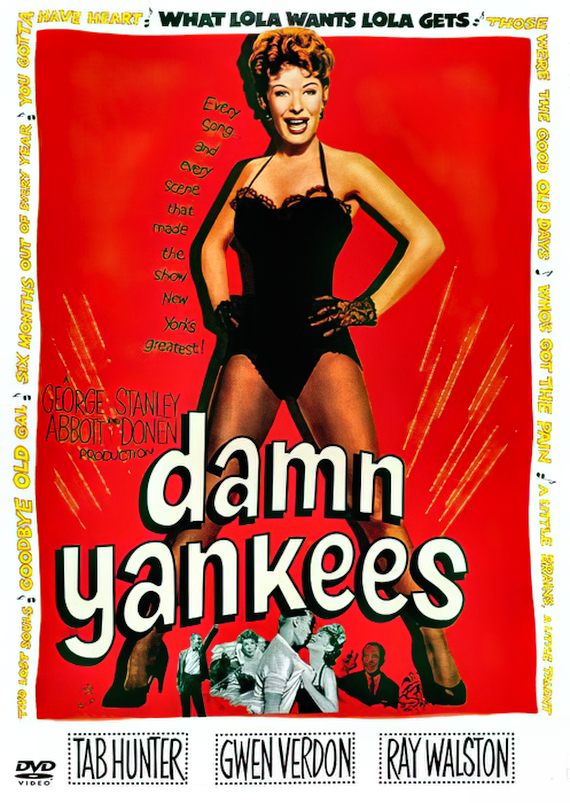
Joe is on his way to catch the third out—a fly ball—when Applegate turns him back into the old Joe Boyd (thereby voiding the contract) but Joe catches the ball anyway, winning the game… and sneaking off from the outfield as joyous crowds flood the field. He quickly changes in the locker room and catches a cab to home, reuniting with Meg. Game and film over, and exeunt omnes, as the Bard used to say.
Tab Hunter was chosen for the film over Douglass, who originated the role on stage, because Tab was the “hot property” of the time. (Same reason Audrey Hepburn was chosen over Julie Andrews for My Fair Lady, or Vanessa Redgrave over Andrews and Richard Harris over Richard Burton for Camelot.) Hunter was chosen for “hunk appeal” to female moviegoers—he wouldn’t come out for another couple of decades—but his popularity began to wane fairly early. (In those days the studio controlled all aspects of stars’ public lives, so you never knew—although many suspected—who was really straight. It was considered suicide to be outed, or known to be gay. A number of “hunky” male stars, like Hunter, were actually closeted, but the studios made sure they either married, or were seen dating, female stars. Nowadays, audiences are more likely to say “who cares? An actor acts!” A much healthier attitude, methinks.
Comments? Sure, you’ve got ’em. I’d like to hear ’em, too. Just comment here, or on Facebook—or you can email me: stevefah at hotmail dot com. (Just keep it polite, okay?) My opinion is, as always, my own, and doesn’t necessarily reflect the views of Amazing Stories or its owner, editor, publisher or other columnists. See you next time!
Steve has been an active fan since the 1970s, when he founded the Palouse Empire Science Fiction Association and the more-or-less late MosCon in Pullman, WA and Moscow, ID, though he started reading SF/F in the early-to-mid 1950s, when he was just a sprat. He moved to Canada in 1985 and quickly became involved with Canadian cons, including ConText (’89 and ’81) and VCON. He’s published a couple of books and a number of short stories, and has collaborated with his two-time Aurora-winning wife Lynne Taylor Fahnestalk on a number of art projects. As of this writing he’s the proofreader for R. Graeme Cameron’s Polar Borealis and Polar Starlight publications. He’s been writing for Amazing Stories off and on since the early 1980s. His column can be found on Amazing Stories most Fridays.









